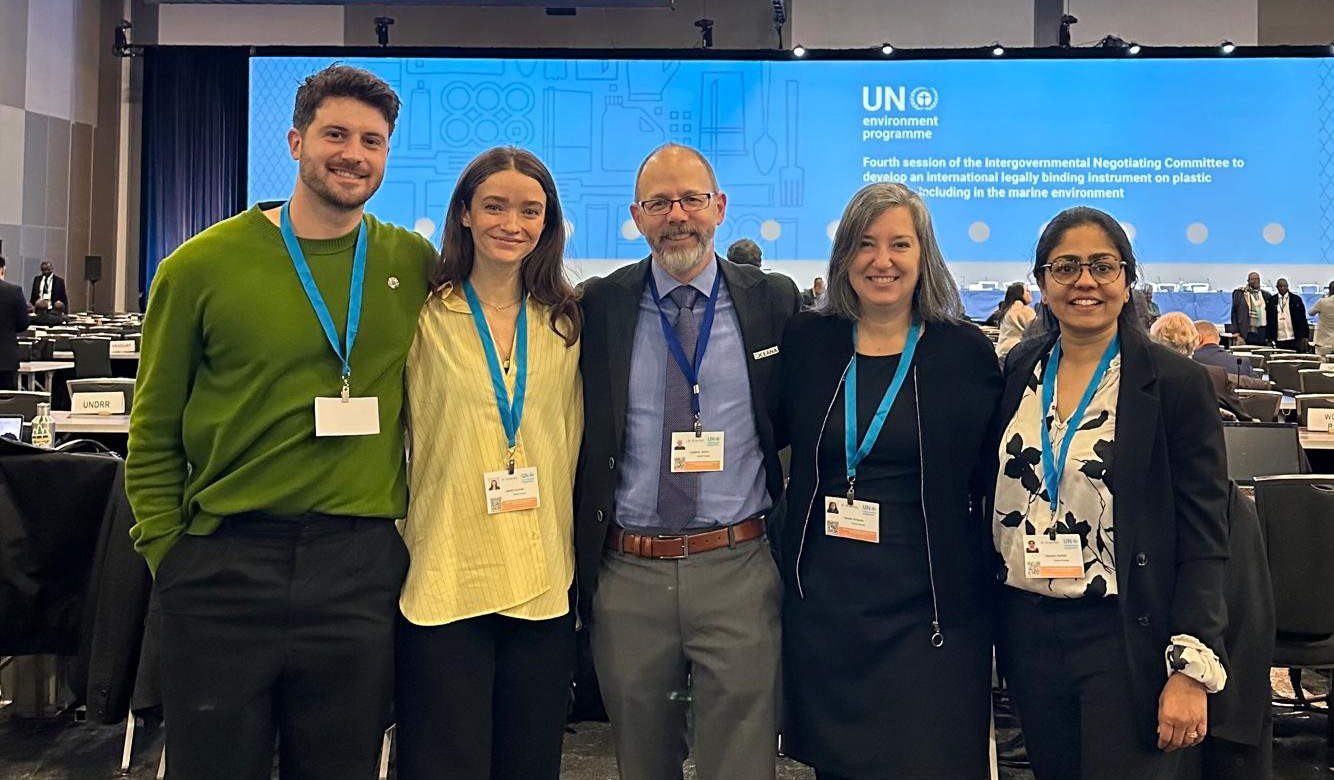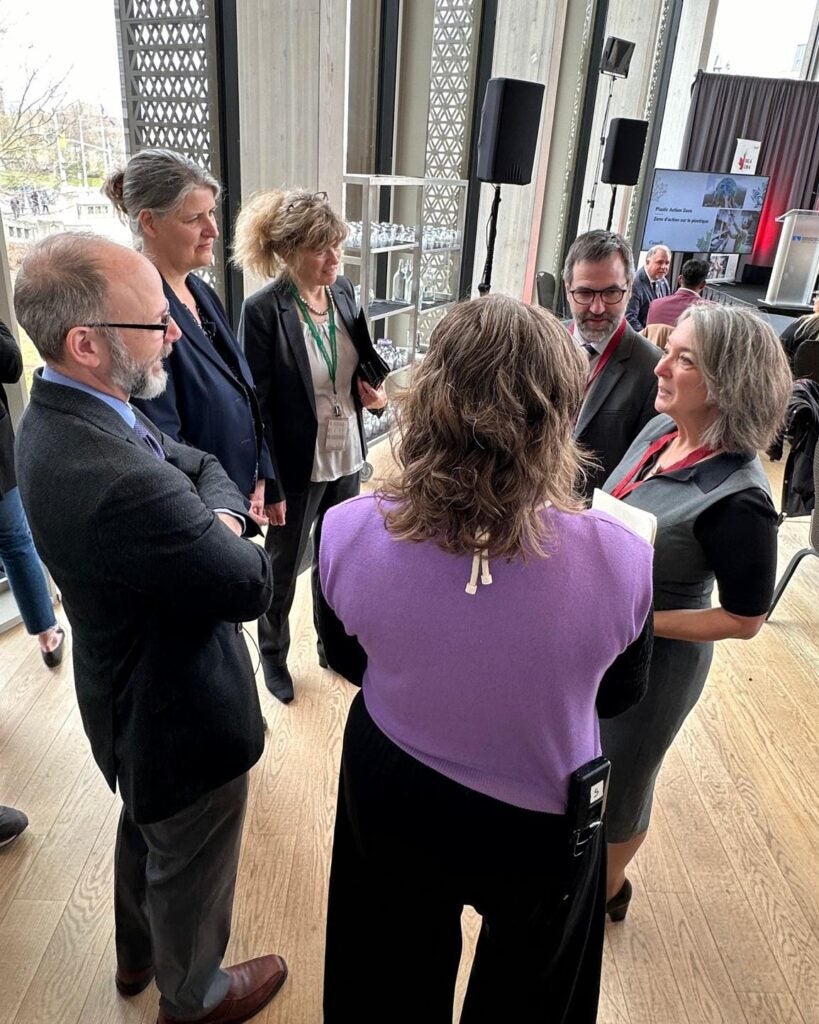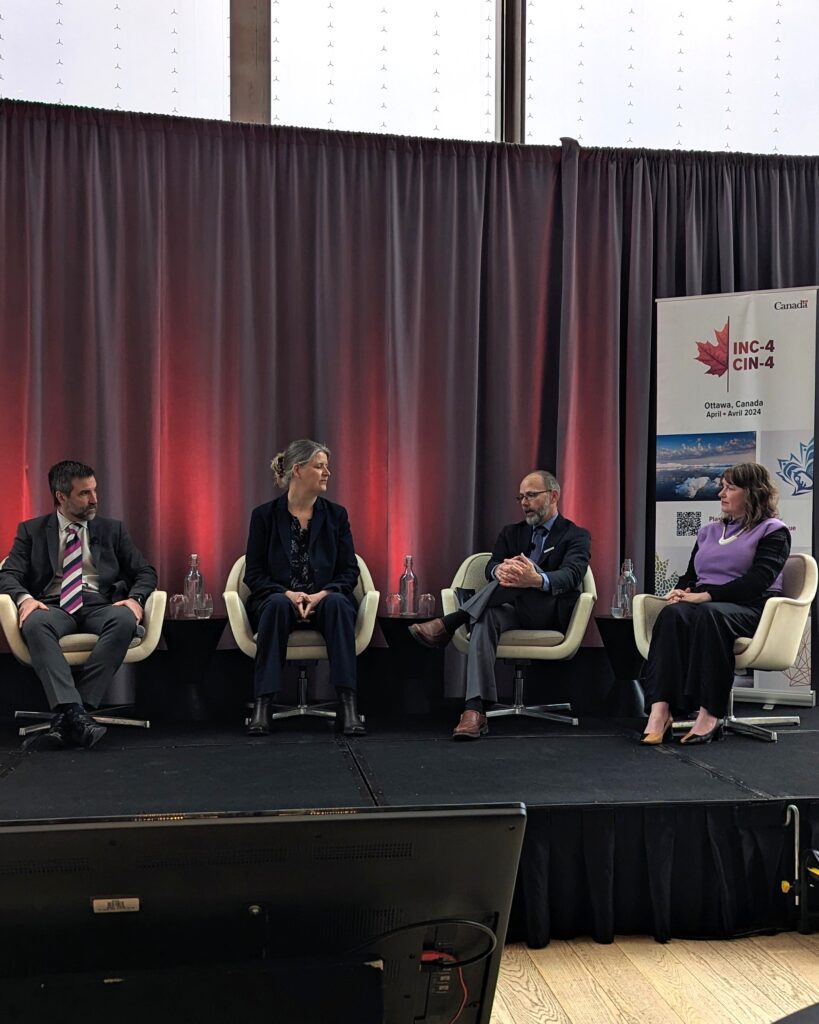May 7, 2024
Breaking Down INC-4: Insights, Outcomes and What’s Next for the Global Plastic Treaty
Estimated reading time: 0 minutes
BY: Rachelle Naddaf
Topics: Plastics
Talks concluded in Ottawa during the early hours of April 30, 2024 at the United Nations Intergovernmental Negotiating Committee (INC-4), for a global plastic treaty. The long days of talks, side events, public demonstrations and discussions with government officials, likeminded organizations and journalists have ended. The outcome? A mosaic of progress and challenges in the fight to stop plastic pollution around the world and here in Canada. Despite resistance and delays from low-ambition countries and plastic industry lobbyists, significant progress was made and I am left feeling cautiously optimistic. Here’s what I learned at INC-4 and why the future for a plastic-pollution free ocean seems brighter.

Bright spots
Unlike at INC-3 in Nairobi last year, delegates at this INC agreed to do intersessional working sessions between INC-4 and INC-5, to drastically advance sections of the treaty text. The objectives of the intersessional work are to advance treaty sections on i) chemicals of concern in plastics and plastic products that pose a risk to human and environmental health, as well as ii) the financial mechanisms to enable the implementation of the treaty.
During the negotiations more than 60 countries backed measures to reduce plastic production. If successful in the final treaty, this could reduce the amount of single-use plastics that end up in the oceans and environment. Although a small group of countries tried to block this important work, production constraints are still on the table for INC-5 and countries must come prepared to negotiate.
Challenges faced
196 lobbyists from fossil fuel and chemical industries registered for these negotiations, a 37 per cent increase from the 143 lobbyists registered at the previous meeting, INC-3. To give you a sense of that scale, these lobbyists outnumbered the 180 delegates from the entire European Union. This created an uneven playing field as more diverse voices are needed from all perspectives to progress towards the global desire of stopping plastic pollution.
Reducing plastic production proved to be the most contentious issue during the negotiations, with petro-states – countries which explicitly own their oil and gas companies – pushing back on plastic production caps and questioning how this would work or be implemented.
Throughout the week, we also saw low-ambition countries continue their delay tactics of inflating the treaty text with an avalanche of edits to slow progress. While delegates were able to achieve streamlined sections of the text, there is still a tough battle ahead to achieve a treaty that is clear, concise and legally-binding.
Canada committed to progress and amplified diverse voices
As a High Ambition Coalition (HAC) member and host for INC-4, eyes were on Canada to lead talks and demonstrate a path forward focused on upstream solutions to plastic pollution, such as banning harmful plastics and prioritizing safe refill-reuse systems. I attended INC-4 Ottawa, after participating in INC-2 Paris and INC-3 Nairobi, advocating for strong actions from the Canadian government domestically as well as in the treaty. These included actions to rein in plastic production, phase out harmful single-use plastics, de-prioritize false solutions like recycling and “biodegradable plastics,” and instead push for circular, closed loop systems like refill and reuse.
As the host country, Canada came to the negotiations with clear goals: make this INC more inclusive than previous sessions, streamline the draft treaty text and seek out intersessional work to keep the process moving forward.
With the aim of enhancing diversity and amplifying various voices in the negotiation process, Canada pursued two main initiatives at INC-4. On Earth Day (April 22), Canada, alongside WWF-International, hosted a partnerships day which brought together sub-national governments (such as states, provinces, municipalities), Indigenous leaders and front-line community advocates to expose the environmental and human health damage caused by plastics.
Running parallel to the plastic treaty negotiations, Canada also established the Plastic Action Zone (PAZ) from April 23-29. The PAZ was a unique space, that wasn’t a part of other INCs, which featured voices in discussion panels and showcases that are often overlooked in the negotiation process. Sub-national governments, front line communities, Indigenous Peoples, researchers, the medical community, industry leaders and environmental organizations participated in PAZ sessions to enrich delegates’ understanding of key plastic treaty elements. Oceana Canada’s Executive Director, Josh Laughren, spoke on the inaugural PAZ panel, alongside Environment Minister Steven Guilbeault, where they discussed Canada’s actions to reduce plastic pollution and what’s needed moving forward.
Canada’s efforts to enhance inclusivity at INC-4 were successful and met with positive feedback from delegates. By addressing the absence of voices impacted by plastic pollution at the negotiating table, Canada has established a precedent with these initiatives for ensuring broader access to the negotiations, paving the way for progress and collaboration in future sessions.
Key moments
As the negotiations came to a close, I heard from Canadian government officials on actions needed domestically and their commitment to an ambitious global plastic treaty.
“The current plastics crisis is having a devasting impact on our economies, our health, and our ecosystems… Canada is committed to agreeing to a global treaty that tackles the lifecycle of plastics, from production through to the consumption and disposal at end of life. And in Canada, this is a difficult conversation.”
– Julie Debrusin, Parliamentary Secretary to the Minster of Environment and Climate Change
Front-line communities exposed the environmental and human health risks associated with all stages of the plastic lifecycle. Remote communities proved that plastic pollution is globally pervasive and harming their ways of life. Human health researchers and medical experts have confidence that plastic chemicals are linked to hormone disruption, cancers and infertility, and that micro/nanoplastics are accumulating in our blood.
To ignore the signs that it is a global priority to phase out single-use plastics, invest in safe, reuse and refill systems and implement health-risk free food packaging is just bad for business. The time to move on plastic reduction is now.
What’s next?
While the final INC-5 for a global plastic treaty will be held from November 25-December 1, 2024, in Busan, South Korea, domestic governments do not have to wait until then to take action. At this stage, the text of the plastic treaty shows promise. However, it will require robust efforts from high-ambition countries and global leaders to ensure the intersessional work advances toward measures that will significantly reduce harmful plastics and chemicals additives and stop plastic pollution.
The evidence that plastic poses a serious risk to environmental and human health is clear. Time is running out and countries who act now to combat plastic pollution will be the ones that future generations look back on with admiration. Canada can be one of them.



